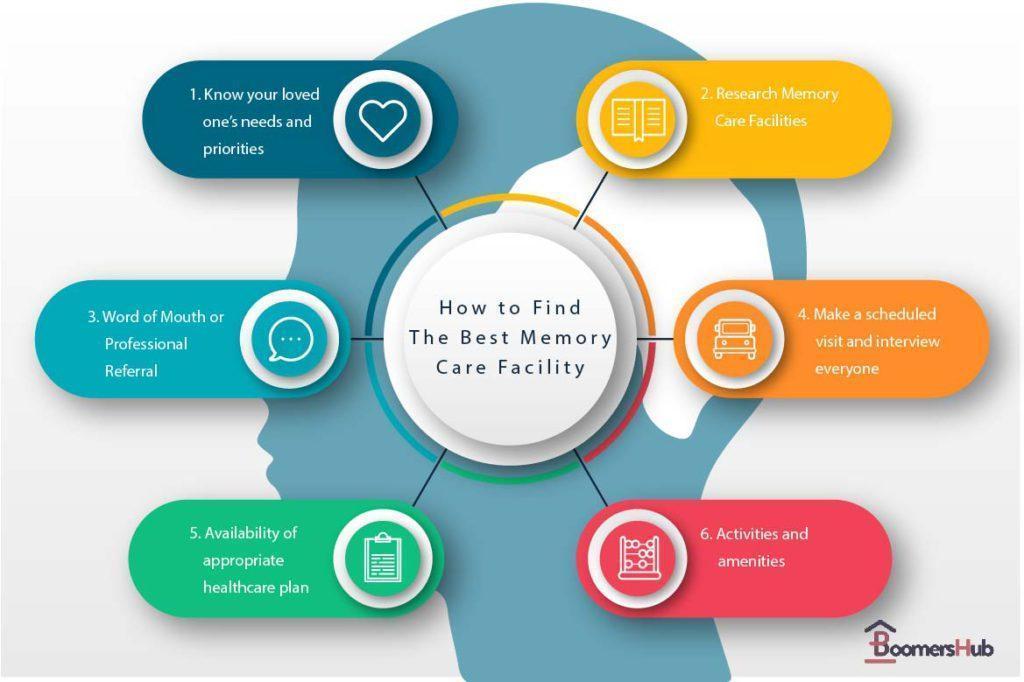Article Contents
Did you know that approximately 6.5 million people aged 65 or above are living with Alzheimer’s disease in the United States in 2022? Alzheimer’s is a neurological disorder that causes memory loss, difficulty doing daily tasks, communication problems, and leads to Dementia. The worst part of these disorders is that they are progressive and will only worsen over time. So, most of the time, they require long-term care and often struggle to find a suitable memory care facility. There are several options – for 24/7 medical attention, nursing homes can be appropriate, while assisted living could be a better option for assistance with activities of daily living (ADLs).
Several years back, my grandmother started showing memory loss and disorientation signs. For example, she’d forget where she kept her belongings, medication schedule, or memories from her past. Initially, none of us could understand the sudden change in her personality, but the symptoms became persistent over time, and she was diagnosed with Dementia. We tried different treatment methods for quite some time, but eventually, we had to move her to a memory care facility for more personalized care. I remember vividly searching for dementia care facilities near me, and trust me; it was quite a struggle!
So, where would you begin your search for a memory care center, and how would you know how to assess the level of care provided? Unfortunately, in my grandma’s case, we struggled to find the right facility for quite some time due to a lack of guidance and knowledge. But don’t worry! For you, we have come up with some tips and guidelines about what to look for in a memory care facility for your senior loved one!
Important things to know about memory care
The idea of your loved one developing memory loss or other signs of a mental disorder can be highly problematic. You feel helpless and desperately want to make it stop, but unfortunately, diseases like Dementia or Alzheimer’s cannot be prevented entirely.
If you think it’s time to consider a memory care facility for your loved one, you must first understand what kind of treatment and care they need. Once you figure that out, you can look for a memory care facility near you that includes all the amenities and services your elderly loved one requires. Often, memory care facilities exist as a part of an assisted living facility or nursing home. However, memory care can also be a standalone long-term facility for seniors with Dementia or Alzheimer’s. These facilities specialized care services through trained caregivers and nurses.
When you notice some signs of possible memory and insight impairment, the best thing you can do is seek professional help. And eventually, move them to a memory care facility for advanced medical care, if needed. There are also multiple specialized units for memory care residents, such as facilities for dementia patients or Alzheimer’s patients. So, you can choose the most suitable one for your senior loved one.
What Is a Memory Care Unit?
Memory care centers are residential communities for seniors with Alzheimer’s disease or Dementia. Only residents with memory impairment are accepted into dedicated memory care homes. Every community component is purposefully designed to support those with cognitive problems, from activities to facility structure.
Memory Care is a residence with shared and private living spaces. Individuals with Dementia receive skilled care, security, and supervision. These facilities provide 24/7 long-term care from trained staff to cater to the residents’ specific needs. In addition, memory care facilities offer activities to stimulate memory and slow down this progressive disease.
Memory care communities also may offer specialist care to assist your elderly loved one with medication and healthcare management. However, these facilities aren’t solely concerned with people’s medical requirements. Instead, they commonly provide secured homes and opportunities for people with impaired memories to socialize or engage in hobbies most suitable to their mental health. In addition, some communities may provide entertaining activities for those living with cognitive changes, such as musical events, taking a walk in the gardens, or visits from therapy pets.
Understand Memory Care Assessments and Care Plans
Since Dementia or Alzheimer’s is a progressive disease, their behaviors change over time. So, it is essential to assess their situation and make care plans accordingly. It can be a complex and ongoing process. The assessments can be done through various tests and cognitive assessments. Usually, caregivers at memory care facilities plan different care plans for early, middle, and later stages patients of Dementia.
Some of the early-stage care plans may include:
- Emotional support
- Communication and socializing
- Help with organizing
For middle-stages:
- Help with activities of daily living (e.g., dressing up, eating, toileting)
- Safety hazard measures (e.g., preventing falls or tracking their whereabouts)
- Behavior management (e.g., dealing with aggressive behavior or depression)
For end-stages:
- 24/7 daily care (personal and medical)
- Mobility support
- Treatment for co-existing health issues (e.g., speech impairment, infections, etc.)
How to Find the Best Memory Care Facility Near You?

Choosing the best memory care or dementia care unit for your loved one is a huge decision. Everything can be overwhelming, and you might not know where to begin. To make things a bit easier for you, we have come up with four crucial considerations below while searching for a memory care facility near you:
1. Know your loved one’s needs and priorities
As mentioned multiple times before, transitioning to memory care or dementia care can be a big blow to your senior loved one. Since they are the ones who will be making a move, you must discuss their needs, preferences, and priorities before choosing a facility. For example, the living situation, availability of activities, visiting restrictions, etc. However, be sure to have proper communication and conversations with your senior loved one before making any decisions to explain why it is necessary. Because moving to memory care is a significant change, it can trigger them. Make them a part of the entire process so they won’t feel left out, and it would be much easier for them to go through the shift.
2. Research Memory Care Facilities
Thankfully, it has become straightforward these days to look for anything online. However, before making a manual visit, try searching for the top-rated memory care facilities in your area on the internet. It is an excellent resource for learning about the licensed facilities in your community.
BoomersHub brings you the perfect platform to search for senior living memory care within your locality. First, go to Memory Care on our website. Inside there, you will have the search bar to search for memory care units in terms of your city name, state name, or zip code. You will find the list of facilities near you with only a few clicks. You can even compare different communities and properties right on our website.
3. Make a Scheduled Visit and interview everyone
Once you have shortlisted some communities of your preference, it’s time to visit the facilities. The visit intends to find out about memory care services. You will be able to make a better decision if you tour the facility at least once before finalizing. Our experienced local advisors can assist you from beginning to end for free.
When inspecting memory care facilities, take a walk through the hallways, wait till lunch, and witness the daily activities. Also, take a look around the rooms that residents stay in. Meet the caregivers and inquire about their services. See if you can call another resident’s family to consult with someone who has dealt with the facility before.
4. Word of Mouth or Professional Referral
Another way of finding a memory care facility is asking around your close circle who has previously searched for such facilities. You can get some honest feedback and plan accordingly. Besides, you can also seek referrals from professionals such as your doctor, social workers, or support group members. That way, you will get unbiased opinions and select the right facility.
5. Availability of Appropriate Healthcare Plan
Another important thing you should check before moving your senior parent or relative to memory care is if they provide personalized healthcare assessments and care plans. This way, you can ensure continuity in their healthcare after their move. For example, you can visit your primary care doctor for up-to-date medical history and medication schedule of your elderly loved one. Also, inquire about the availability of other health and medical needs such as eye care or dental care, or cosmetic services.
6. Activities and amenities
It is crucial to ensure that your senior loved one can enjoy various activities after they move to a memory care facility. Check what kind of interactive activities and events the memory care facilitates. Engaging in different social activities and hobbies is extremely important for Alzheimer’s patients because it keeps their brains stimulated and sharp.
Also, go through the memory care facility’s list of amenities, such as gyms, gardens, libraries, swimming pools, and game rooms. More extensive facilities offer many of these amenities, but that might also come with additional costs.
What final questions to ask a memory care facility ( Free Checklist)
The memory care checklist can be categorized into different sections. Below we will look into some key observations and questions to ask memory care facilities before choosing one:
General Observations
- What is the Memory Care’s philosophy and approach to caregiving?
- Does the memory care facility have a friendly and welcoming atmosphere?
- Cleanliness and hygiene maintenance
- What are the security considerations?
- Appearance and condition of current residents
- Policies and regulations (e.g., pet friendliness, visiting hours)
Living Situation
- What are the rooms like? Are they private or shared?
- Are they clean and spacious?
- Do rooms have proper ventilation, natural lighting, and comfortable temperature?
- Availability of attached bathrooms, emergency call system, handrails
- Does the facility have common rooms, a kitchen, and backyard gardens?
- Easy access to common areas and outdoors
Staff
- 24/7 availability of professional doctors and nurses in the memory care facility
- Are they well-groomed and well-behaved?
- Are they licensed or certificated care providers?
- Does the staff encourage independence among residents and respect patients’ life struggles?
- Acceptable staff-to-resident ratio
- Are they kind and caring to the residents? Do they seem helpful and approachable?
- What kind of specialized training does the staff receive in the memory care facility?
Services and amenities
- Does the facility have around-the-clock medical and non-medical supervision?
- Do they have ongoing care assessments and treatment plans for each patient? What memory care therapies or services are offered?
- What are the meal services? What level of customization can you get with meal plans? Can you cater to specific dietary requirements?
- Are there fun and creative life-enriching activities and socializing options?
- Do they offer laundry, maintenance, and housekeeping services? How frequently do they give them out?
- Is there a specific care plan for each resident?
- Medical emergency policies and warning systems
- What kind of particular attention do they give to wandering residents? What are the options for residents who become physically aggressive?
- Assistance with activities of daily living (ADLs)
- Availability of transportation services and mobility devices
Cost
- What is the monthly average cost of the memory care facility?
- Are there any hidden costs or extra charges for specific services?
- How often does the monthly rate change?
- What is the payment procedure? What are the acceptable payment methods?
- Appeal and feedback process in case of dissatisfaction or disagreement
- Insurance requirements, availability of financial programs
Conclusion
Finding a memory care facility that aligns with your needs can be a daunting task, especially with so much information floating around at the same time. But there are ways to filter through the info bubble and choose the care home that’s appropriate for your elderly loved one. First, consider the level of care that is needed, then look at the cost structure, staff experience, and availability of activities. Finally, tour the facility to get the overall feel of it.
We hope you found our tips to find a memory care facility useful, and if you do not want to go through so much hassle of looking for memory care on your own, consider getting in touch with a local advisor. The local advisors work closely alongside seniors to find the right facility for their care needs, lifestyle preferences, and finances.
You can speak with one of BoomersHub’s Family Advisors about the best memory care facilities in your area by calling +(877) 409-0666 or emailing info@boomershub.com. Our services are completely free!
Frequently Asked Questions for Those Considering Memory Care
How do I pay for memory care?
You can use the following methods to pay for memory care:
- Medicaid: For low-income seniors, Medicaid may cover some of the costs for eligible residents if the memory care facility allows such payments.
- Personal savings and assets: One can use their personal savings, stocks, bonds, or pensions to pay for memory care. Also, liquidating assets such as jewelry or artwork can be a source of funding too.
- Reverse mortgages: Borrowing money against one’s home equity is called a reverse mortgage. Seniors can use that money to pay for their memory care facility.
- Veteran’s Benefits: Retired military personnel may receive allowances through the VA Aid and Attendance or Community Residential Care program to cover their memory care bills.
- Private insurance: Apart from Medicare or other government-issued health care coverage, memory care residents can opt for private insurance policies. However, it is recommended to thoroughly go through the policy regulations before signing the contract.
What should I look for in a memory care community?
It would be best if you considered these factors while searching for a memory care community:
- Safe and easy-to-navigate living arrangement
- Experienced and trained staff
- Availability of engaging activities and events
- Health assessment and care plans
- Amenities and features
How to find a memory care facility that fits your budget?
According to Genworth Financial, the average monthly cost of memory care was $5,430 in 2021, with a 4.5% increase every year. So, it is important to evaluate the care costs before choosing a facility. You may check the cost structure, additional fee structure, monthly fee and services provided, annual price increase rate, and frequency, then decide if it is affordable for you or your loved one.
How do I choose the right memory care community?
First of all, determine the healthcare and personal needs of your senior loved one. Then start with your research and look for your nearby memory care facilities to check their services and features. Once you have shortlisted the options, you may pay a personal visit to have a thorough evaluation of the facility. You may also get help from local advisors to find the right memory care community.
How do you evaluate a memory care facility?
You can evaluate a memory care facility by:
- Determining your or your loved one’s needs and priorities
- Understanding the kind of training and expertise the caregivers have
- Assess the facilities’ safety concerns
- Checking available activities options that help with memory enhancement
- Evaluating cost to service ratio
Where is the best place for someone with dementia?
Many dementia patients may move to memory care or nursing home facilities at some point. But there are some other senior care options that they consider, such as in-home care, adult daycare centers, continuing care retirement communities, etc. However, it all depends on the present condition and care needs of a patient.
What is the best memory care?
The best memory care is one that ensures a safe and stimulating environment for its residents, along with providing well-trained staff and quality care for each patient. Also, the facility should have a reasonable cost structure that aligns with its services and amenities. Visit BoomersHub’s Memory Care page to find top memory care near you.
What questions should I ask a long-term care facility?
You should ask the following questions to a long-term care facility:
- What is their staff-to-resident ratio?
- Do they have easy-to-navigate floor plans?
- What are the services and amenities they provide?
- Do they have personalized care plans?
- Do they have 24/7 on-site doctors or registered nurses in the facility?
- What is the cost structure, and are there any hidden charges?
- Do they accept Medicare or Medicaid?
- What memory-enhancing activities do they offer?
What is the life expectancy for someone with dementia?
The average life expectancy of some with dementia is around 8-10 years. Older adults who get diagnosed with dementia in their 80s or 90s may have less life expectancy. However, these are primarily generic stats and may differ from person to person.
When should a dementia patient go into care?
Since dementia is a progressive disease, it is expected that the patient’s condition will worsen over time. If you see that your senior loved one is at a stage where the care and support provided at home are inadequate, you might consider moving them to a care facility. It is always a tough decision, but you have to see the person’s best interests. On the other hand, if a dementia patient needs 24/7 care and cannot perform their daily tasks, it might be time to seek an alternative care plan.

